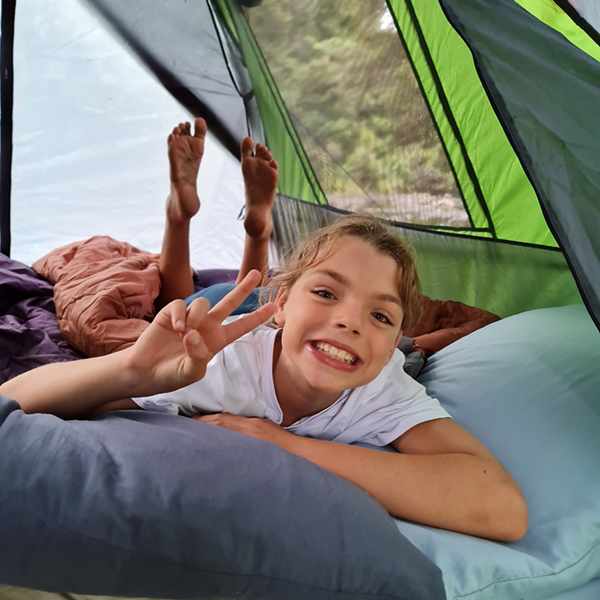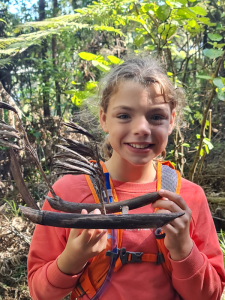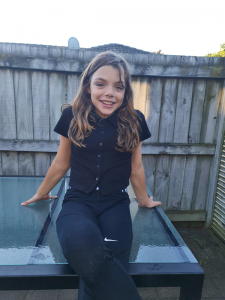
9 December 2021
A Pāpāmoa mum is pleading with people still putting off getting the COVID-19 vaccine to roll up their sleeves after her 11-year-old daughter contracted the virus during a fleeting hug with an unvaccinated adult at a family dinner.
Her family’s experience with COVID-19 has highlighted for Joanne Gates just how infectious the Delta variant is, and how effective the vaccine is at protecting people who are double vaccinated and fully immunised.
“One simple hug between two unvaccinated people was the infection point,” she says. “That’s all it took to pass the virus on. Our lives have been disrupted for three weeks now, but we’re also proof of how those of us who are double-vaxxed can avoid COVID; it’s incredible, really.”
Daughter Shakyra has fully recovered and is back at Mount Maunganui Intermediate this week after spending 15 days at home self-isolating with her family. She tested positive for COVID-19 on November 23, one week after attending a family member’s birthday dinner at a Tauranga restaurant. She became infected after briefly hugging a young man in their group who was unvaccinated, and unknowingly carrying the virus. The man’s six-year-old son also tested positive for COVID-19 a few days later.
Other family members at the dinner were double vaccinated, and continue to test negative for COVID-19 while they wait in mandatory self-isolation at their Pāpāmoa home.
Joanne says interaction at the birthday dinner was the catalyst for a chain of transmission that proves how vulnerable children under 12 are to the virus circulating in the Bay of Plenty.
“We’re a family that does all the right things around COVID. Those of us eligible to get the vaccine are double vaccinated, we sign in using the COVID Tracer app wherever we go, we check the Locations of Interest and follow the guidance to self-isolate when we need to.
“But sadly, because someone unvaccinated was unknowingly infected and passed it into our family, we’ve suffered the consequences, and they are quite huge really. My plea is for everyone who can to trust the advice of health professionals, avoid misinformation online, and roll up your sleeves for the vulnerable people in our society, especially children who are not yet eligible for the vaccine.”
Before the positive test result, Joanne held fears for Shakyra getting COVID-19. She was born premature at only 26 weeks old with pulmonary stenosis (congenital heart defect) and had her lungs constantly monitored during her first six months. She also has a small hole in her heart that, while no longer considered life-threatening, compromises her health.
“She definitely had a rough start in life,” says Joanne. “During her first year, she would catch a cold at the drop of a hat. She’s very active now, but I’ve been worried about how sick she would get with COVID-19.”
Fortunately, Shakyra only experienced minor symptoms, including a runny nose and cough. Far more distressing was the anxiety she felt after returning the positive test. “She took on quite a lot in those first few days,” says Joanne. “She was worried about passing it on to other people and getting bullied at school.”


Shakyra Bachop-Mauger, 11, is enjoying her freedom again after spending 15 days in self-isolation with COVID-19.
Her school, however, was fantastic, says Joanne. “We were open with her teacher and classmates who FaceTimed her at home. She had no issues at all and that gave her peace of mind.”
She’s now delighted to be back at school and reunited with friends.
For Joanne, her partner and 15-year-old daughter, they’ve had to undergo further COVID testing and self-isolate for an additional 10 days as Shakyra’s household contacts. In total, they will spend 24 days isolating at home. During that time, her oldest daughter has been unable to sit her NCEA exams and her partner’s building work has also been impacted. Joanne, who is the manager of Idea Services, has been able to work from home, but she says three weeks in isolation does take its toll.
“We miss the beach and can’t wait to get out. But the care we’ve received from our GP has been great. He’s made calls to us every day and made sure we had a pulse oximeter to measure Shakyra’s oxygen levels as an extra precaution. It helps having someone you trust looking out for you.”
Dr Dan McIntosh, Shakyra’s family GP at Dee St Medical Centre, says getting vaccinated is the best way to protect the most vulnerable people in our community.
“Shakyra’s story illustrates how your vaccination can protect others and how getting tested early can prevent spread in your community.“This family has done everything right and, as a result, have successfully negotiated COVID infection.”
ENDS